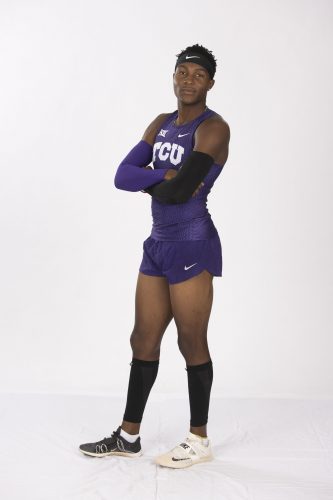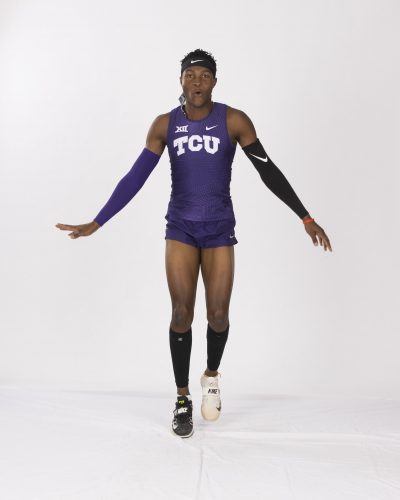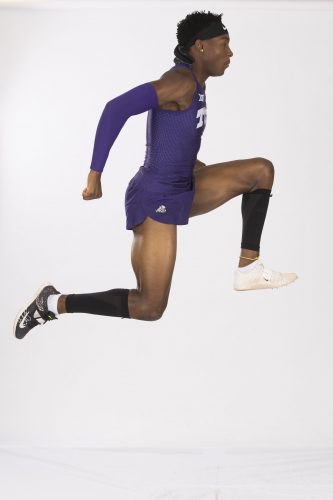Du Mapaya’s Career Leaps Forward
The senior triple jumper from Zimbabwe is a six-time All-American.
Courtesy of TCU Athletics
Du Mapaya’s Career Leaps Forward
The senior triple jumper from Zimbabwe is a six-time All-American.
Chengetayi “Du” Mapaya finished second in triple jump at the NCAA Indoor Track & Field Championships in March with a TCU record-breaking 16.96-meter distance. The senior talks about what drives him and his Olympic aspirations.
Why TCU?
Head Coach Darryl Anderson came to Zimbabwe and he had a camp where he just wanted to see athletes, but unfortunately I wasn’t at that camp. I had heard of him. Then, later on, he heard about me. He contacted me and I decided to come to America for track.
The coaches believed in me. They saw I was jumping decently well. I was jumping about 15.65 meters. They offered me a full ride. I was actually talking to other coaches, and most of them offered just a partial scholarship. When I started jumping 16 and 16.30 meters, everyone came. I didn’t want to go to a school that hadn’t wanted me before I improved. I decided to come to TCU because I believed that would help me get better. Also the campus, when I looked at it online, looked pretty.

Du Mapaya is the 2021 Indoor Track & Field Big 12 Champion in triple jump. Courtesy of TCU Athletics | Photo by Sharon Ellman
Have you always done the triple jump event or did you do any other event before?
In high school I started doing triple jump, but before that I was running the 100-meter, 200-meter and I did the 400 at some point. I was just reasonably good in Zimbabwe for those events, so I just did a lot of them.
Did someone influence you to start triple jumping?
No, it was myself. I just wanted to be on the high school team because it had some swag. I wanted to find an easy event that I could do, that my body could do, and I realized I could make the team in triple jump, rather than another event. I started practicing for it by myself and I became good.
Some people see sports as just a hobby. Have you had the idea of taking triple jump to a more competitive level?
No, I just wanted to be on my high school team, honestly. That was my goal. I never really wanted to take triple jump far, it just took me there. I then realized I was good. People started contacting me wanting to coach me and all that. It just happened by itself. Then I realized I could do so much with it, be on the Zimbabwe team, come here and now realize I can go bigger.
What does triple jump mean to you?
It has made me associate with different cultures. I’ve traveled so many parts of the world — just learning about other people is something that I enjoy doing and triple jump did that for me. I just realized when you put in the work for it, it gives you what you wanted it to give you.
What part of triple jump do you enjoy the most?
I enjoy the last phase because that’s when you’re supposed to take flight like what Coach Shawn Jackson says. I enjoy the event as a whole.
Do you pursue triple jump for pleasure, or is the main goal winning competitions?
At practice, I think about the person I have to do better than. If he’s doing 10 reps, I’m doing 11. Or if he’s doing 10, I’m doing 10 but correctly.
I’ve grown as a person, and I’ve been trying to find a purpose for why I like winning. I need something to drive me on days when I’m feeling bad. There are some days I just want to do nothing but then there’s a purpose. For me, it has come down to doing it for my family because I don’t come from a very high-income family. Just them not paying for my tuition is something that drives me to keep winning. I have to keep winning so my family doesn’t have to struggle. It’s going to put me in a position where I can help my family later on. That’s the drive I have.
How hard was it to balance your athletic career with high school work?
Honestly, it was not really hard for me. My dad is a teacher so he was always on me just to make sure I was on track with my schoolwork. My mom too, she always encouraged me to study. I knew I had to pass my exams so at times, I had to be serious and just study, but not as much as I should have.
Is the level from high school triple jump different or similar to the level seen in college?
It wasn’t hard because I was just one step ahead of everyone in high school in Zimbabwe. Then, my last two years, I figured out how to be better and improve my technique. When I came to the university my freshman year, I had a hard time. I never finished in first place, I always came third and I didn’t like that because I always won every competition in high school. That made me really angry. Then my coach told me that I was number three in all of America and that was a big deal. People were telling me that being an All American is a big deal. But I just wanted to come first. So I had a hard time at the beginning.
Is there a particular coach that you think helped you develop your skills better?
I’d say to be where I am, I was my own coach to start. I just used to watch YouTube videos. I had a coach in high school. She guided me and taught me how to do the hop. But she worked at another school, so she couldn’t coach me every time, so I had to do my work by myself. But she got me to a level where I could be seen. I’ve only had two coaches. Coach Shawn Jackson has the facilities and the knowledge of the event. He got me to the next level. Each coach has gotten me to a different stage.

Du Mapaya says the last phase of the triple jump is taking flight. His coaches have nicknamed him Du Airlines. Courtesy of TCU Athletics | Photo by Sharon Ellman
How has Covid impacted your season?
I just have an end goal of making the Olympics. No matter the restrictions or anything, I’m going to abide to everything to make sure I just keep jumping. Nothing has fazed me because I just want to reach my goal.
Speaking of goals, you recently came in second at the NCAA Indoor Track & Field Championships in triple jump. What was the road like for achieving this?
It was amazing, I always wanted to be in a position where I could compete with the best. It was a blessing just to be there again competing.
What would you say was the biggest obstacle on that road?
I had never gotten to compete at Arkansas before and I didn’t know the runway. It was difficult figuring out my run.
Are there any specific methods that you use to perform better while competing?
I just do the training program that my coach gives me. Whatever the coach tells me to do, if I do it right, I’ll be ready for competition.
How do you handle the pressure of competing at the highest level?
I mean, the day before the competition, I’m actually very chilled. I just eat a lot because I know the following day I’m probably not going eat a lot because I’ll be nervous.
I just act like it’s a normal day. I treat every competition as if it’s not a championship competition, but a normal competition. I just calm myself down to go in there and just have fun because I enjoy jumping. I don’t want to be in a position where I’m feeling too pressured — it’s more about enjoying it.
Athletes have to be in excellent shape, both physically and mentally. How do you handle diet plans and maybe once in a while the opportunity to go out with some friends?
I don’t really go out with anyone, honestly. I usually stay to myself and have a close group of friends. My roommates are athletes too. They’re also from Zimbabwe. We know our goal is to make the Olympics. During this Covid time, we don’t want to be going to parties and put our team or ourselves at risk. We try keep safe.

Du Mapaya is the 2021 Indoor Track & Field NCAA silver medalist in triple jump. Courtesy of TCU Athletics | Photo by Sharon Ellman
What has been your most challenging competition overall?
I’d say my toughest definitely was the IAAF World Athletics Championships in Doha, Qatar, in 2019. When I went to the world championships, I was competing with the people I used to watch on YouTube — the videos I used to train myself and practice. Instead of focusing on competing with them, I was awestruck. I was distracted a lot. It was hard for me to focus on myself. I was mesmerized with where I was and forgot that I was competing with them. That was my toughest competition, and I learned from that. Now I know I’m going to compete with the best in the world. I still look at them to get a better technique, but I see them as the same as me.
Apart from competing in the Olympics, what else do you plan to do with triple jump in the future?
In triple jump, or track in general, there’s a European circuit called the Diamond League. I want to go professional and just compete around the world and attract as many people as I can.
I want to use my career as a bridge for people back home in Zimbabwe. I want them to know that there’s hope in everything that they do, that you can get whatever you put yourself into. I’m using it as a platform for people who need help, who need some sort of motivation. I am hopeful this leads to improving the facilities in Zimbabwe because they’re not as good as American facilities.
Do you plan to return home eventually?
Yeah, I’m going to go back to Zimbabwe after I’m done being a professional athlete. So probably in the next 12 years I’ll be back in Zimbabwe.
Editor’s Note: The questions and answers have been edited for clarity and length.

Your comments are welcome
Comments
Related reading:
Sports: Riff Ram
Darryl Anderson Trains Record-Setters
The director of men’s and women’s Track & Field and Cross Country talks school records, the importance of a college degree and the feeling of seeing his student-athletes develop into Olympians.
Sports: Riff Ram
First Person with … Scotty Newton
The triple jumper talks about his Olympic and TCU role models and how he challenges himself to think like a champion.
Sports: Riff Ram
Jeremiah Donati Leads Athletics Through Pandemic
TCU’s director of intercollegiate athletics talks about the new club on the east side of Amon G. Carter Stadium and doughnuts with his daughters.